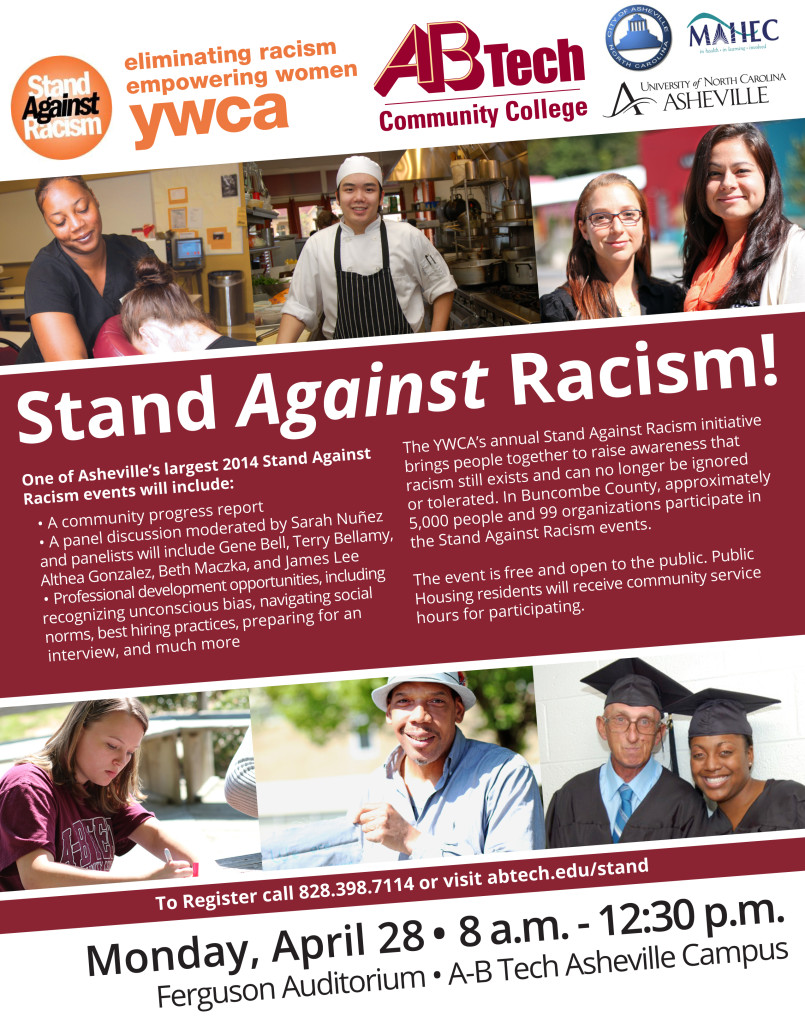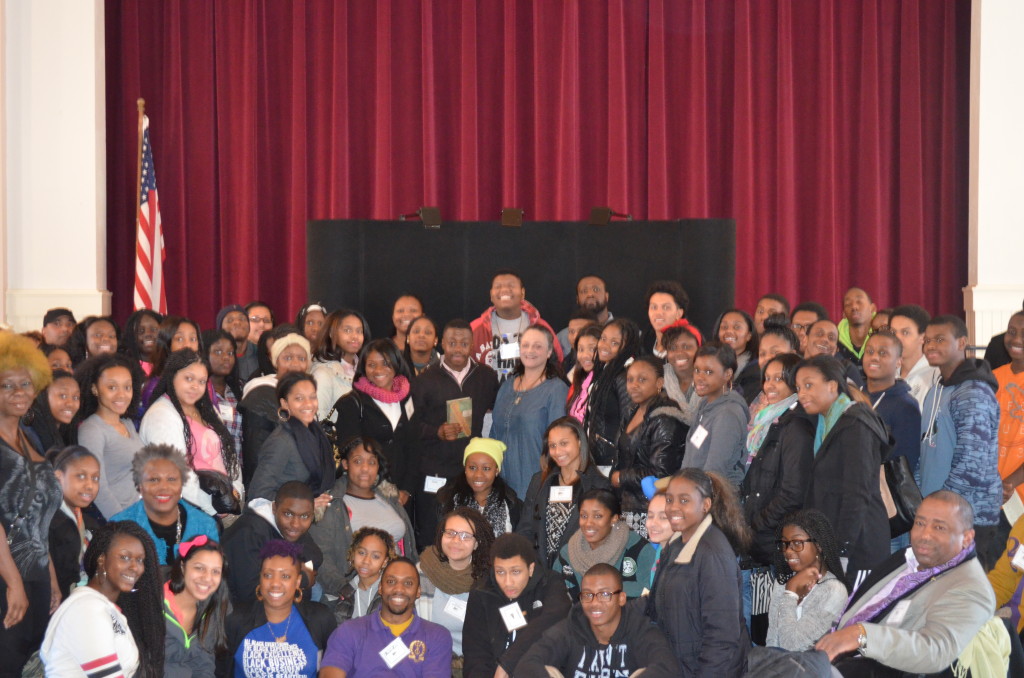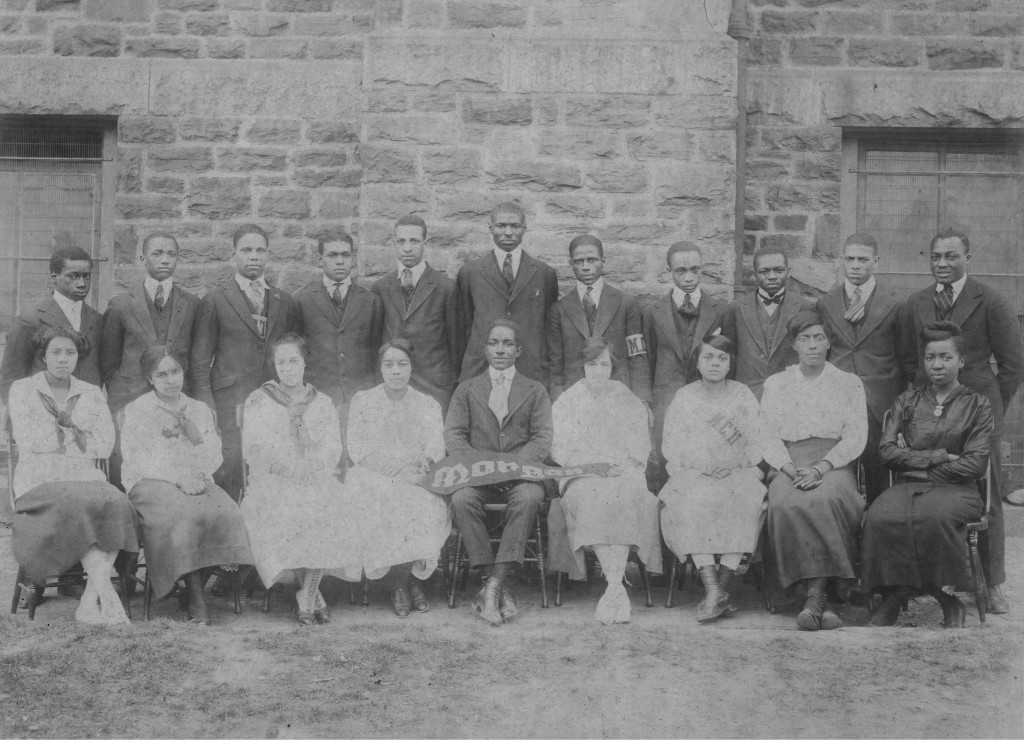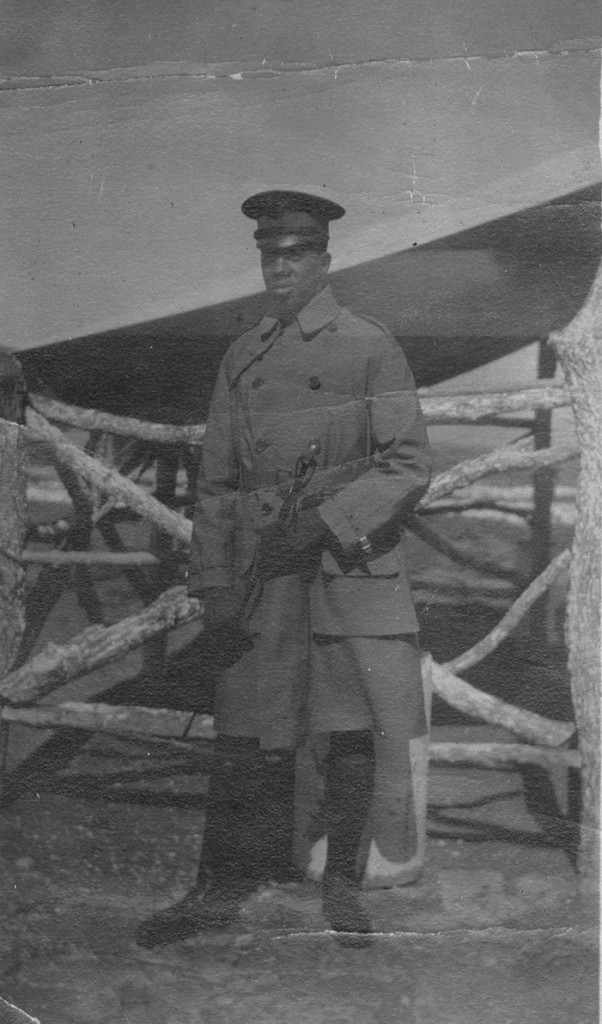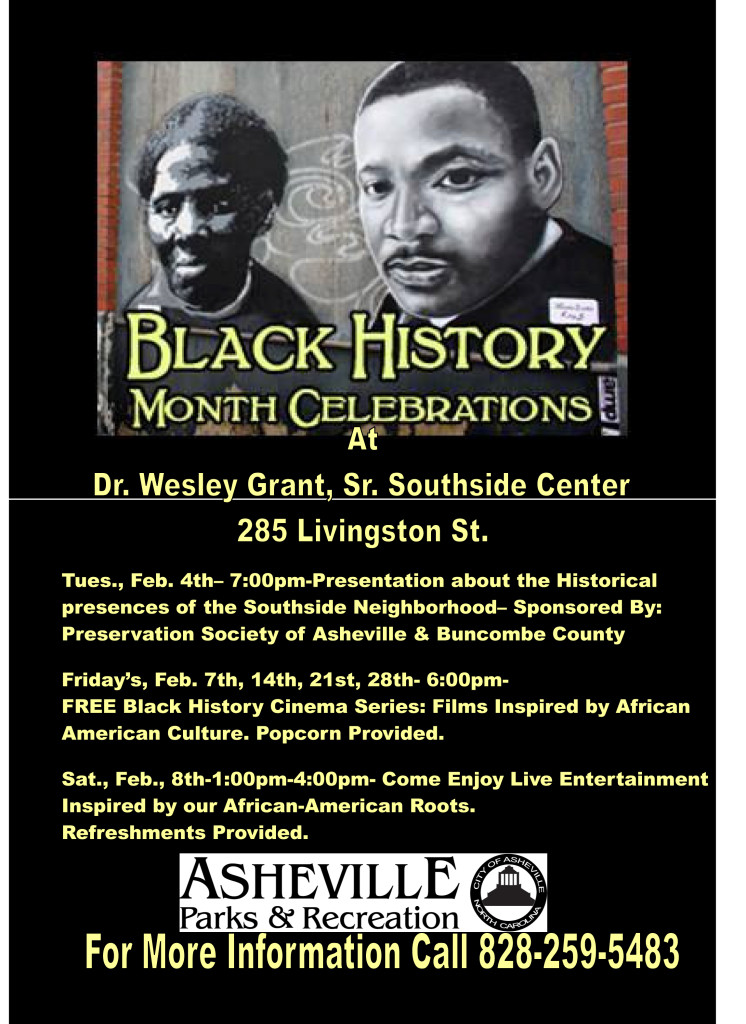Category Archives: Community
Using Oral History for Sharing & Preserving your Institution’s Message and History
Spring 2014 – The Gathering Place Project Presents:
How to use Oral History for Sharing & Preserving your Institution’s Message and History
Monday, April 29, 2014
The Oteen Center
176 Riceville Road Asheville, NC 28805
9:00 AM – 12:30 PM Registration Required
Join Michelle Lanier, Director of the North Carolina African American Heritage Commission with the Gathering Place Project as she discusses how to use oral histories for sharing and preserving your institution’s message and history. The Gathering Place Project will offer 6 statewide workshops this year that focus on the three main challenges that face our African American Museums and heritage practitioners: preservation, sharing, research.
Participants will hear success stories, best practices, and learn about available resources.
Please find your registration form here.
Click to learn more about the Gathering Place Project
Burton Street Neighborhood needs to be heard!
Please read this story by David Forbes in Mountain Express about the impact of the I-26 Connector on the Burton Street Community.
How many times does the Burton Street community have to bear this burden? When you look at the overview map of changes to I-26, “The Big Picture”, try zooming in on the homes slated for demolition, the neighborhood to be divided again. (You can zoom in on the photo above by clicking on it and then pressing ⌘= on a Mac or CTRL+ on a Windows computer) Asheville has had a long history of hurting African American neighborhoods in the name of “progress”. Please stand with this community!
The Black Thief Stereotype, Shopping While Black, and Consumer Racial Profiling in the 21st Century.
UNC Asheville and the Center for Diversity Education present:
The Black Thief Stereotype, Shopping While Black, and Consumer Racial Profiling in the 21st Century.
Thursday, March 27, 5:30 p.m., Sherrill Athletic Center, Mountain Suites
Guest Lecturer: Dr. Shaun Gabbidon, (1967 b, Jamaican descent, born in England, raised in U.S.A) Criminologist and Academic.

Dr. Gabbidon has served as a fellow at Harvard University’s W. E. B. Du Bois Institute for Afro-American Research, and has taught at the Center for Africana Studies at the University of Pennsylvania. The author of more than 100 scholarly publications including more than 60 peer-reviewed articles and 11 books, his most recent books include Race and Crime (3rd edition; 2012, SAGE) and the co-authored book, A Theory of African American Offending (2011; Routledge). Professor Gabbidon currently serves as the Founding Editor of the SAGE journal, Race and Justice: An International Journal. The recipient of numerous awards, Dr. Gabbidon was most recently awarded the 2009 W.E.B. Du Bois Award from the Western Society of Criminology and the 2011 Outstanding Mentor Award from the Academy of Criminal Justice Sciences.
South Asheville Colored Cemetery, 1840 – 1943
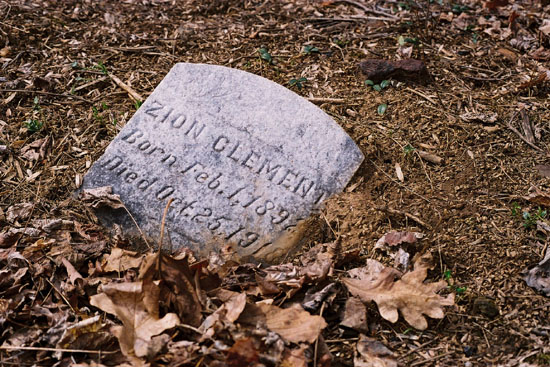
Among the items in Special Collections at D. Hiden Ramsey Library at the Unviersity of North Carolina at Asheville is an oral history collection about the South Asheville Colored Cemetery.
Interviews with elderly African American natives of Asheville, NC, give a vivid record of rites of death and burial for black residents of Asheville before 1940.
Collection includes: Interviews with nine African American residents of Asheville, NC with knowledge of persons buried in the South Asheville Colored Cemetery ; A partial listing from the Buncombe County Death Registry of persons buried in South Asheville Colored Cemetery ; A list of artifacts related to burials in the cemetery and sources for further information about the cemetery ; An article: “The South Asheville Colored Cemetery 1840-1943,” by Wilburn Hayden, Jr.
Please visit their site and learn about this historic site in our community. When paper records are damaged or nonexistent, sometimes a headstone might bear the only written proof of an ancestor’s existence. In any case, cemeteries are sacred places, and without regular care and maintenance, they are soon overtaken by the growth of vegetation. I am grateful to know that this cemetery is going to be receiving some much needed attention and research expertise to help map it, clean it up, repair broken stones. Although many names are lost to history, an effort is being made to record more of the names of those buried there, both in marked and unmarked graves, and to re-connect those ancestors to their families in our community today.
YMI hosts NYC Omega Black College Tour
This afternoon, YMI Cultural Center was honored to welcome 80+ students and their chaperones on this year’s Black College Tour sponsored by Xi Phi chapter of Omega Psi Phi. This annual tour introduces a group of students from the New York metropolitan area to a selection of historically black colleges and universities. (HBCU)
Since 1988 the Black College Tour has taken hundreds of students from the New York metropolitan area to 16 historically Black Colleges and Universities (HBCU) in North Carolina, Virginia, Washington, D.C., Maryland, Delaware and Pennsylvania. The program is enhanced by preparatory workshops designed to give students a greater understanding of their career options and the educational requirements needed to fulfill them. Eighty-five percent of the students who participate in the program go on to college. Thirty-five percent of those students choose a college that was visited on the Tour… (from their website)
After being denied education for so long, upon emancipation freedman embraced every opportunity to learn. Those who could read taught others. Churches housed schools. And around the country, HBCU began to form. After the second Morrill Act of 1890 was passed, states that excluded black students from their land grant colleges were required to establish separate land grant colleges for them.
There are 106 historically black colleges and universities (HBCUs) in the United States, including public and private, two-year and four-year institutions, medical schools and community colleges.[2][3] Most are located in the former slave states and territories of the U.S. (Wikipedia)
I was asked to make a presentation to the group about the history of YMI. I was thrilled to be able to share my knowledge of some of the founders and leaders of YMI and Asheville’s black community, and how HBCU influenced the course of their lives.
In YMI’s history, William Trent and Dr. J. W. Walker were both graduates of Livingstone College who were instrumental in YMI’s early days. Dr. Walker received his medical degree from Leonard Medical School of Shaw University. Mr. Trent later became president of Livingstone College. Both Mr. Trent and Dr. Walker’s wives were also graduates of Shaw. Ernest McKissick attended Shaw with the help of Mr. Trent and Dr. Walker. His son Floyd McKissick later attended Morehouse College and enrolled at North Carolina College (NCC) Law School, later North Carolina Central University, but he also successfully sued for admission to UNC Law School and became the first black student to be admitted there.
Many graduates of all-black Stephens-Lee High School went on to attend HBCU, including Dr. Frank O. Richards, a Stephens-Lee High School graduate who received his medical degree from Howard University. About a dozen students from Stephens-Lee High formed the Asheville Student Congress on Racial Equality (A-SCORE). Mr. Marvin Chambers, A-SCORE founding member and community leader, pursued his engineering degree from North Carolina A&T, and said he wouldn’t trade the experience and education he received there for a million dollars. Attorney James E. Fergusen, II, another A-SCORE founding member, later went on to become student body president at North Carolina Central University. Many of Asheville’s current leaders include graduates from HBCU.
My own family history includes several members who attended HBCU including the siblings of my great great great grandmother, Mary Jane Jamison Mason. Her sister, Sally Jamison Malone, attended Walden University, a historically black college in Nasheville, TN before moving to Topeka, KS where she ran a Florence Crittenden Home for Unwed Mothers. Their brother, Dr. James Monroe Jamison, was part of the first graduating class from Meharry Medical College, the first medical school in the South for African Americans. My great great grandfather Reginald W. Stewart attended Lincoln University. My great grandmother Addie Jane Johnson Stewart graduated from Morgan College (now Morgan State University) in 1917. She later taught one of her neighbors to read. I am sure that in many cases, people came home from HBCU and their education and leadership experiences caused a ripple of positive change around them as they served as role models, educators, and professionals in their communities.
I had something particularly special to share with this group of visiting students and Omega Psi Phi fraternity members. In one of our old family photo albums, my great grandfather Samuel Stewart had included photos of his friend Nathaniel Burrell, with whom he served in the US Army during World War I. In researching Mr. Burrell’s life (wondering if he might have been some relation), I learned that Nathaniel Burrell went on to become a charter member of Omega Psi Phi’s Xi Phi Chapter in New York City.
In researching HBCU in preparation for the students’ visit, I found an article from the LA times that said black students attending a four year HBCU have a 70% graduation rate, versus 30% for black students at predominantly white colleges. Some other benefits include being surrounded by black achievers and leaders, no longer being a minority in the school community, smaller class sizes, diverse curriculum, caring staff, role models, continuing the legacy of HBCU, lack of discrimination. Of course, many HBCU struggle with funding and with keeping costs down, so students have to weigh their needs against what each school has to offer. Choosing a college is a very personal choice influenced by many factors, but I hope that the students come through this journey feeling inspired and encouraged to continue the legacy of HBCU.
The White House just released its first class of HBCU All Stars: 75 undergraduate, graduate and professional students for their accomplishments in academics, leadership and civic engagement. Hopefully these colleges will remain strong and healthy, fostering the growth of the next generation of leaders. Wherever their paths lead, I asked the students visiting us today to remain life-long learners: to read, to find their own gifts, and then find ways to give back to their communities.
New Events on our Calendar
Please check out and show up for some of these upcoming events just added to our calendar. You can see more details on the links provided or in our calendar.
Feb 13, 7pm – 9:00pm
Advance Care Planning Workshop
UNC Asheville – Reuter Center 102, The Manheimer Room
Feb 13, 6:30pm – 8:00pm
Film Showing: The African Americans – Many Rivers to Cross
Into the Fire (1861-1896)
UNC Asheville – Highsmith University Union 114 Intercultural Center
Feb 14, 11:30am – 12:30pm
Public Lecture: Incarceration Nation (expired link)
UNC Asheville, Humanities Lecture Hall
Feb 14, 11:30am – 12:30pm
Public Lecture: The Contagion of Freedom: Anti- Slavery, Women’s Rights & Economic Justice
UNC Asheville – Lipinsky Auditorium
Feb 15, 1pm – 3pm
Honoring African-American Women from Then… On!
Linwood Crump Shiloh Complex, 121 Shiloh Rd.
Feb 15, 4pm – 6pm
Community Garden Networking and Collaborative Planning Event
Conference Room at United Way Building
South French Broad & Hilliard, Asheville
Feb 18, 6pm – 8pm
Voting Rights Update
Pack Memorial Library
Feb 20, 6:30- 8:30pm
Watch n Learn: “Four Little Girls” Documentary by Spike Lee
Highsmith Student Union 143 – Grotto
Feb 22, 2pm – 4pm
Reaching Back, Moving Forward
Stephens-Lee Recreation Center
30 George Washington Carver Ave, Asheville
March 21, 11:30-12:30
Public Lecture: Black Freedom Struggle (expired link)
UNC Asheville, Humanities Lecture Hall
Black History Month – Breakfast @ Hillcrest Community Center
Featuring local speakers who will share their knowledge and experience. All public housing residents are welcome.
Hillcrest’s Carl E. Johnson Community Center
Every Saturday in February: 1, 8, 15, 22. 9am
9am -11am
Black History Month Events
Hood Talk – Teen Summit
“HOOD TALK”: Presented by Joe Greene.
To develop positive energy throughout our community of communication and strength!! A New Version of Teen Summit in 2014. Ages 12 and up. 1st HOOD TALK Thursday February 13, 6-8 at Burton St Center. Hope to see u there with plenty of ?’s..

